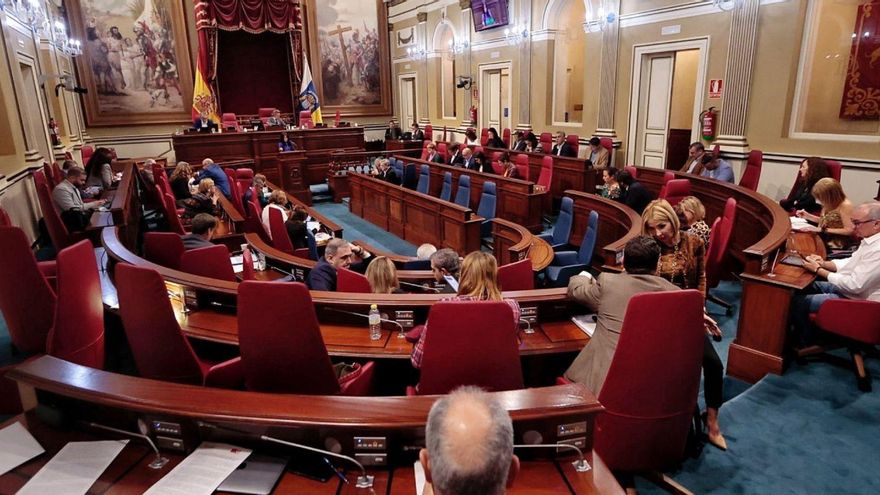
A fast parliamentary plenary session. The Chamber meets as if to have a decaf in a corner. An expression of general annoyance, barely offset by the diet attached to the salary, a diet that on days like yesterday pays off more, because you get to Tenerife at nine in the morning and take the return flight at one in the afternoon. On the blue bench only the presence of the president Angel Victor Torresof the vice president Roman Rodriguez, who talks endlessly on the lapel of the former, and of Noemí Santana, who arrives slightly late, because now she spends the day of interviews, tweeting in defense of Irene Montero, inaugurating things and even putting first toniques in unexpected works. Farther on sits Sebastián Franquis, with his usual appearance of an irascible cat that has just gotten out of bed and is pacing around because he hasn’t drunk his milk yet. The fourth chief of the pact, Casimiro Curbelo, is also present in his seat and from a distance that cannot be forgotten he greeted President Torres with affection, waving his arm slowly, like the golden cats in Chinese bazaars. The participation is not bad, although the deputies present do not exceed sixty.
It was only a matter of definitively approving two reports requested by the Congress of Deputies in compliance with a constitutional and statutory mandate: the first, on the already approved law of general State budgets for 2023, and the second, on the bill to the establishment of temporary energy and credit taxes (electricity companies and banks) to create a “temporary solidarity tax on large fortunes”, thus modifying certain tax regulations. Of course, there was no surprise. Following the brief but substantial parliamentary tradition, the reports were approved unanimously although, of course, Gustavo Matos had a cold and had to lead the shadow of a debate in which few people seemed interested. So uninterested that, for example, the mixed group did not intervene: neither Vidina Espino nor Ricardo Fernández de la Puente appeared in the plenary hall.
–Because of the mixed group… Let’s see… – Matos tried to sharpen his eyes – No, because of the mixed group there is no one. Well, Mrs. Melody Mendoza has the floor for the Gomera Socialist Group…
Mendoza gave a more or less concise description of the reports in broad strokes. His lordship is basically a descriptivist: he has never heard a political argument from him. She doesn’t seem to be very interested in her either. Then, inevitably, Manuel Marrero came up on behalf of Sí Podemos Canary Islands, the last representative of the conscience of the island proletariat, who was congratulated, it could not be otherwise, for the great social advances that nest in the general budgets for next year. Fernando Enseñat, the PP spokesman, is always pissed off and slightly pissed off, as if he suffered from a herniated disc. One always knows what Mr. Enseñat is going to say. Even if you ripped him off the stands, blindfolded him on a plane, and parachuted him into the Gobi desert, as soon as he touched the sand he would repeat the same speech from last week, last month, and last year. It is already known, “things that are better are not thanks to you, but in spite of you.” The chronicler has a notebook full of asterisks and each of them has drawn them when Enseñat has released his sentence. He is slightly tiring.
From his seat his leader, Manuel DominguezI watched him as someone who has never been interested in Greek art is scrutinizing a Greek statue. Mr. Domínguez, like Enseñat, never smiles. He acts as if each parliamentary plenary session were a wake where only sad, outraged, admonitory things can and should be said. Esther González, economist on duty for the Nueva Canarias parliamentary group, fulfilled a minimum analytical commitment to vote as soon as possible.
The only substance, of course, was forged in the interventions of Canarian Coalition and the PSOE. Rosa Dávila mentioned the bug, that is, that what was being reported was, in reality, the amendments to the budget project that CC managed to introduce “thanks to the work of our two deputies”, especially the free land transport public (buses and tram) from next January 1st. The deputy went so far as to assure that the autonomous government and various councils and town halls were trying to boycott free transport, “with recommendations as ridiculous as from day 1 not to take the bus or the tram at peak hours.” The socialist spokesman, Iñaki Lavandera, regretted that Dávila “was capable of saying that.” But contrary to his usual tendency, the socialist deputy did not embark on the path of disqualification and was almost brotherly. In the final vote, both reports were unanimously endorsed by the plenary session, Matos adjourned the session to send himself a brake and the deputies fled without too much consideration.
Outside, barely four drops fell and you didn’t even notice a bit of cold. Strictly a procedure had been held, not a plenary session. One left before the end of the year. Afterwards, not one iota of parliamentarianism will remain and everything will be devoured by the meeting and the propaganda with its inextinguishable appetite. As in the rest of the legislature, but more savage, boring and starkly.
















